|
|
|
Sort Order |
|
|
|
Items / Page
|
|
|
|
|
|
|
| Srl | Item |
| 1 |
ID:
133233
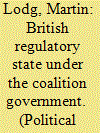

|
|
|
|
|
| Publication |
2014.
|
| Summary/Abstract |
What have been the effects of coalition government on the British regulatory state? This article argues that the politics of regulation have been largely about a continuation of existing patterns, namely volatile stability rather than more far-reaching change. The British regulatory state continues to be defined by boundary conflicts between the world of 'politics' and 'regulation', by conflicting calls for centralisation and decentralised autonomy, and by tensions between the wish to 'reduce' regulation and the realisation of inherent complexities.
|
|
|
|
|
|
|
|
|
|
|
|
|
|
|
|
| 2 |
ID:
171444
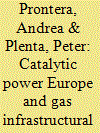

|
|
|
|
|
| Summary/Abstract |
By focusing on the natural gas sector and infrastructural policy in the Visegrad countries this article aims to reassess the EU's role in energy security governance. It argues that the EU can be conceptualised as a catalytic state rather than a regulatory state. It develops the notion of Catalytic Power Europe to highlight the specific type of power that the EU (as a catalytic state) can deploy to achieve its objectives. Catalytic Power Europe differs from existing conceptions of Regulatory and Market Power Europe. It relies on nodality and treasury rather than authority and on mechanism of connectivity and mobilisation rather than enforcement. It highlights the role of the European Commission as a facilitator and coalition builder rather than a regulator and market builder as in the regulatory state perspective. This role is illustrated by analysing the major gas interconnector projects and liquefied natural gas importing terminal that are under development in the V4 and that can affect their energy security. Catalytic Power Europe influences the V4 inter-group dynamics reducing the scope for uncoordinated and unilateral strategies. In this way, it also affects the prospect of EU-Russia energy relations undermining Moscow's divide et impera strategies in the region.
|
|
|
|
|
|
|
|
|
|
|
|
|
|
|
|
| 3 |
ID:
158638
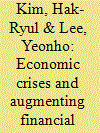

|
|
|
|
|
| Summary/Abstract |
Despite negative public opinion, the role of the Korean government has expanded, while overcoming two rounds of global financial crises. The phenomenon of the re-swelling state is mainly attributed to the strengthening of the central bureaucracy, in particular the financial bureaucracy, rather than the whole central government or the state. The argument of the strengthening of the ‘state’ or the ‘government’ after economic crises might be subject to the error of generalization. Through the two rounds of economic crises, the financial bureaucracy succeeded in acquiring the authority of market supervision and industrial support. In consequence, the bureaucracy's institutional supremacy within the government grew less challenged. The central bureaucracy was no longer the loyal servant to the President. It has reinforced its institutional strength and autonomy vis-a-vis the President, the National Assembly, the Central Bank and civil society, under the pretext of building up the rational and autonomous market and democratic politics.
|
|
|
|
|
|
|
|
|
|
|
|
|
|
|
|
| 4 |
ID:
095193
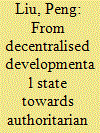

|
|
|
|
|
| Publication |
2010.
|
| Summary/Abstract |
This paper attempts to answer three questions about the contemporary Chinese drug safety regulation system: why did the Chinese government reform its drug safety monitoring system and build a regulatory regime at the end of the 1990s? What obstacles will it face? What unique characteristics does it possess? Was it the collapse of the Interest Community of Government, Enterprise and Shiye Unit (ICGES) that fostered the rise of the regulatory regime in contemporary China's drug safety monitoring field? Three major structural obstacles threaten the building of a high-quality regulatory regime: problematic regulatory independence caused by decentralised developmentalism, an administration-reliant regulatory style and rent-seeking corruption brought about by the authoritarian political system. The author is inclined to characterise the current Chinese drug safety regulatory regime as an "authoritarian regulatory state" and argues that Chinese drug safety regulatory regime-building is still a work in progress.
|
|
|
|
|
|
|
|
|
|
|
|
|
|
|
|
| 5 |
ID:
137367
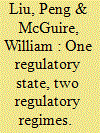

|
|
|
|
|
| Summary/Abstract |
As China proceeds with a process of urbanization unprecedented in human history, it maintains an urban-biased governance regime in many areas, including food safety regulation. Using secondary data and interviews with officials from the Changping district in Beijing, this article systematically defines the main characteristics of China's dual food safety regulation regimes, highlighting differences between urban and rural areas in four dimensions: policy structure, funding source, staff structure and resource allocation. This article also provides an explanatory framework to understand this dual regime's development and persistence from a neo-institutionalism perspective. Three main explanatory variables are advanced: historical legacy, dual incentive structures, and dual economic and industrial patterns. While China's urbanization process and governance structure, including the food safety regulatory regime, are not complete by Western standards, we emphasize this problem is best understood by examining China's unique socioeconomic and cultural context.
|
|
|
|
|
|
|
|
|
|
|
|
|
|
|
|
| 6 |
ID:
139642
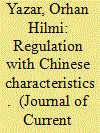

|
|
|
|
|
| Summary/Abstract |
The regulatory agency responsible for prudential supervision of the banks in China, the China Banking Regulatory Commission (CBRC), is not an independent authority. The agency’s regulatory actions are constrained by the central government, which has to balance the prudential and non-prudential consequences of bank regulation for its political survival. The conditions and limits of the government’s influence on the CBRC is analysed through an investigation of three regulatory cases. The conclusion is that the CBRC’s regulatory actions are determined by the relative importance of prudential outcomes for the government’s policy objectives.
|
|
|
|
|
|
|
|
|
|
|
|
|
|
|
|
| 7 |
ID:
077757
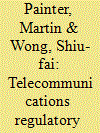

|
|
|
|
|
| Publication |
2007.
|
| Summary/Abstract |
Successful economic liberalization somewhat paradoxically requires high levels of state capacity, while 'deregulated' markets deploy new regulatory mechanisms that, rather than diminishing state power, reconfigure it. A comparative case study into the recent liberalization reforms of the telecommunications sectors of Hong Kong and Singapore is presented here in order to throw light on these developments. The end result of the reform processes in each jurisdiction is quite similar - globally open, competitive and highly efficient telecommunications markets in which major global companies are leading players. However, the routes by which this end result was achieved tell different stories about the manner in which governments balance domestic interests in the process of liberalization. They build on local institutional strengths and deploy instruments appropriate to their own bureaucratic and political contexts. Correspondingly, in constructing the 'new regulatory state', they produce subtle variations on the pro-competitive model of regulation. However, detailed analysis of the two reformed telecommunications regimes shows that underlying these differences is the prominence of a common set of instruments that make less use of highly intrusive, direct forms of state power but greater use of more indirect forms that thrive 'in the shadow' of state authority, a phenomenon that is at the heart of theorizing about the new regulatory state. These instruments enhance rather than diminish state capacity where they are deployed strategically by governments
|
|
|
|
|
|
|
|
|
|
|
|
|
|
|
|
|
|
|
|
|